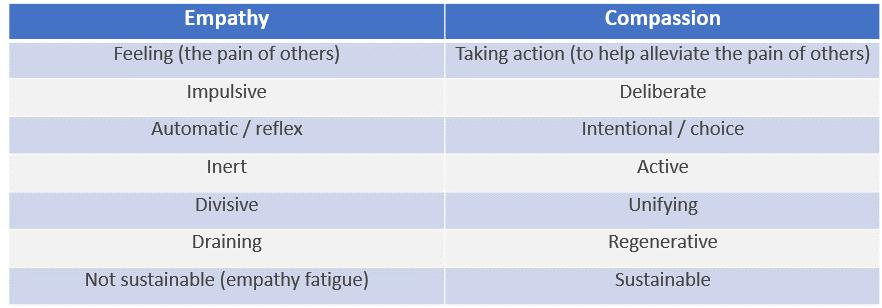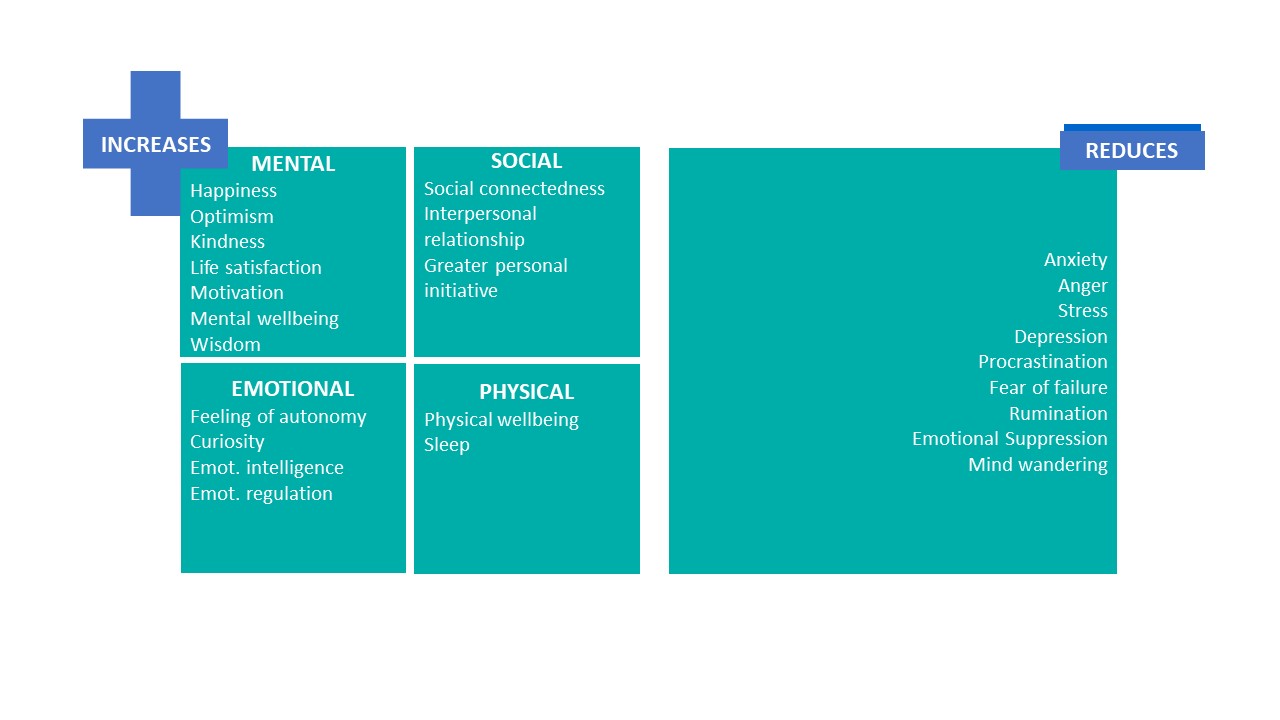While compassion is an inherent quality we all possess, psychology, neuroscience and more recently the corporate world as well as public sectors show that it is an orientation and skill that can be cultivated and strengthened to increase the well-being of employees, organisations and society (2).
For a long time, I mixed the terms compassion and empathy. Even though I knew there was a difference, I could not quite explain it. It’s easy to misuse both terms as interchangeable synonyms, however there are quite a few distinctions between them.
I started digging into the topic and found so much information published on the importance of compassion, for people’s own numerous (health) benefits as well as for improved leadership behaviour. Quite intrigued by the topic, I decided to enrol into a Compassion Cultivating Training (CCT) course, originally developed by Stanford University and offered by both Stanford University – under their Centre for Compassion and Altruism Research and Education – and by the Compassion Institute. I am halfway through the course, hence I so wanted to write an article about it.
Do you consider yourself as self-critical? If it’s the case and based on my own experience talking to managers and leaders, you are like 90% of leaders taking part in a resilience program and scoring high at the self-critical factor (meaning poor results in terms of resilience). This factor is one of the 60 factors used by the Resilience Institute to measure resilience ratio across the world. It is considered one of the top three risks in people with the lowest resilience ratio. Pretty much 9 times out of 10 debriefs I’ve had with participants who completed their resilience diagnostic, their self-critical score was high. This is another reason why I wanted to learn about compassion as being self-critical can be crippling. And self-compassion seems to be one of the best ways to overcome and reduce our inner intolerant, critical, and judgmental voice.
So let’s start by defining both terms:
EMPATHY:
“The ability to share someone else’s feelings or experiences by imagining what it would be like to be in that person’s situation”. Cambridge Dictionary
COMPASSION:
“A strong feeling of sympathy and sadness for the suffering or bad luck of others and a wish to help them”. Cambridge Dictionary
So what are the difference between compassion and empathy
First, empathy and compassion are represented in different areas of our brain. Training compassion or empathy leads to differential plasticity in neural networks.
With empathy, we join suffering of others without helping or taking action.
With compassion, we take a step away from empathy and ask “how can we help”.
To help remember the difference, think of it like this:
EMPATHY + ACTION = COMPASSION (4).
Professor of Psychology at Yale University, Paul Bloom, author of the book Against Empathy said, “Recent research in neuroscience and psychology shows that empathy makes us biased, tribal, and often cruel.”
Indeed, studies suggest that empathy — while well-intentioned — isn’t neutral. It can even sometimes hurt more than help our relationships and our ability to lead effectively. Empathy can make us unconsciously more sympathetic towards individuals we relate to more. This makes us less likely to connect with people whose experiences don’t mirror ours.
Despite all these, empathy should not be avoided. Empathy is essential to connect with others, and then we can go the extra miles to lead with compassion.
So let’s see those differences in a more visual way:

On top of the above, research done in health care industry, shows more compassion is associated with less burnout. That is, compassion can have powerful beneficial effects not only for the receiver, but also for the giver of compassion (4).
How can we move from empathy to compassion
“Simply” take action. You could channel your feelings of empathy into compassionate acts. When a person feels pain and you feel their pain, too, acting to alleviate it can become a healing act for both of you. In other words, compassion gives you a place to put your empathy.
Why Self-compassion is so important to develop compassion towards others
So now that we all agree (don’t we?) that it makes more sense to focus on compassion than empathy, let’s define self-compassion. Indeed, we can’t develop compassion for others if we are stuck in our self-critical state of mind.
Self-compassion is not equal to self-esteem. People with high self-esteem engage in downward social comparison, high narcissism, bullying. Also self-esteem has no impact on wellbeing, as opposed to self-compassion. Self-compassion is compassion turned inwards. Actually, self-compassion has so many benefits we need to take at least one minutes to list them all. It does seem to be the magic emotion that everyone should develop considering the number of benefits we could get out of it.
So self-compassion…

And icing on the cake, self compassionate people are more compassionate towards other people in general, so it’s double bonus!
How to apply this at work?
For leadership, understanding that difference and choosing your approach deliberately is critical. It can determine whether you and your team members (and loved ones) will feel positive emotions. The latest research shows that focusing on compassion and mental health leads to strong, sustainable leadership. It also leads to greater self-awareness.
Compassion is a vital component of any effective leader, it’s an evidence-based skill that is integral to leading effectively and holding teams together. People’s brains respond more positively to leaders and managers who show compassion, and neuroimaging research can demonstrate that. Creating a compassionate culture has been linked with lower exhaustion within employees (one of the elements of burnout) as well as lower absenteeism (5) and presenteeism.
How to create a compassionate culture?
Offer training on MBI (Mindfulness Based Interventions), Mindfulness Based Stress Reduction (MBSR), pure mindfulness, meditation, etc. Recent systematic review on 56 randomized controlled trials shows that MBIs are beneficial to leaders in reducing stress, burnout, mental distress while improving well-being, compassion and job satisfaction (6). Activating mindfulness will help them be and stay fully present in the moment, which is one of the roots of compassion. Indeed, according to Kristin Neff, pioneer and expert in the field, self-compassion is composed of three main components: self-kindness, a sense of common humanity, and mindfulness. Mindfulness is a non-judgmental, receptive state of mind in which thoughts and feelings are observed as they are, without suppressing or denying them. You can’t ignore your pain and feel compassion for it at the same time (3).
Tips on how to become a more compassionate leader
- Start small. Even less than a minute could be enough to start with, as research shows that leaders could already reduce someone’s anxiety level with 40 seconds of compassion (5). How to do this?
- Learn to listen without being judgmental. This could definitely help with previous advise. If leaders start to listen to their team members without interruption, judgement and with full attention, they will already have an impact on the person they are talking to after less than a minute.
- Practice self-care. In order to be more compassionate towards themselves and others, leaders have to start by looking after themselves. It can often be overwhelming and exhausting to listen, absorb, help others. Ensure they take enough breaks throughout your day, sleep and eat well, practice what makes them feel good and energised on a daily basis. The better they feel, the better they are able to provide compassion to others.
Let’s not end this article without mentioning that yes, compassion on its own is not enough. If you want leaders to be effective and performant, they also have to give tough feedback, make hard decisions that will impact people’s life, such as laying team members off. Showing compassion in leadership can’t come at the expense of wisdom and effectiveness. However, even laying off people can be done with a compassionate attitude, don’t you think?
Sources:
- CCARE from Stanford University – The Center for Compassion and Altruism Research and Education, viewed in June 2023 at: https://ccare.stanford.edu/
- Compassion Institute, viewed in June 2023 at: compassioninstitute.com/research
- Neff, K. D. (2012). The science of self-compassion. In C. Germer & R. Siegel (Eds.), Compassion and
Wisdom in Psychotherapy (pp. 79-92). New York: Guilford Press - Singer T., Klimecki O. M., (2014), Empathy and Compassion, Current Biology Vol 24 No 18
- Trzeciak, S., Mazzarelli A., Seppälä E. (2023), Leading with Compassion Has Research-Backed Benefits, viewed in Harvard Business Review on June 2023 at: https://hbr.org/2023/02/leading-with-compassion-has-research-backed-benefits
- Vonderlin R, Biermann M, Bohus M et al., (2020), Mindfulness-based programs in the workplace: a meta-analysis of randomized controlled trials. Mind 2020. doi: 10.1007/s12671-020-01328-3


